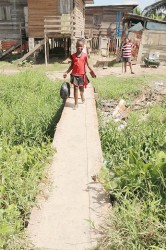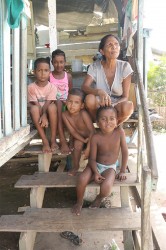Story by Jeanna Pearson
Photos by Arian Browne
Jane Cabral wakes up every morning to the smell of marijuana wafting across her small makeshift house that was once made of plastic.
Things are getting better now: she can afford to buy wood to build a better shelter for her children; she can sleep comfortably without wondering if the wind would blow down her plastic house, but mostly she can never be called a squatter again.
Skull City has been regularised.
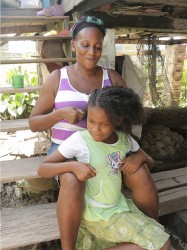
step combing her
daughter’s hair.
Photo by Arian Browne
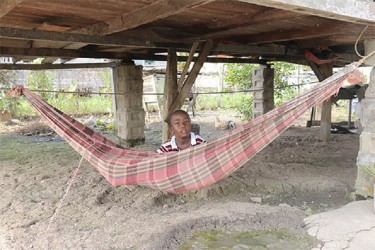
Sandwiched between Patentia Housing Scheme and a sea of canefields on the West Bank Demerara, Skull City has been home to hundreds of squatters who could not afford to pay a house rent or buy a piece of land. It was once known as the Plastic Bag City because many of the people who went to squat there built plastic houses. It was often confused with another squatting area called Plastic City.
At present, there are over 150 houses in the area, many of which accommodate large families, with four to six children. Fourteen years ago, the first set of people who went to squat on the estate were mostly single mothers looking for place to stay with their children.
Cabral, a woman in her forties, spends her days digging a drain to keep her yard from flooding. She farms in her yard and saves every dollar to buy materials to build her house.
She said when she first moved to Skull City with her three children, they set up a plastic shack, big enough to accommodate one bed. Whenever the rain fell she put her son to sleep under the bed so that he would not get wet, while she would take the rain until the next morning. Most mornings she had to rebuild the house.
“It was very hard. And it still is because we don’t have lights and it’s punishing,” she said.
She stated that after the government regularized the lands, the Guyana Power and Light (GPL) had promised to give them electricity while the Public Works Ministry promised roads.
“There are no roads,” she said, but GPL went to some houses and set up poles for electricity. However, after a while they returned and took away the current. “They made promises to give us streets and proper drains, but nothing was ever done,” she said.
Seeta Ramasundar, 52, seemed thankful for her small home and family. Fourteen years ago, when her husband left her and the bills were piling up, Ramsundar could not afford to pay rent and so she was forced to move with her three children.
She did not have an education and so she would fry plantain chips every day and sell them to villagers just to be able to put enough food on her children’s plates.
“We were very poor people and whatever work I got in the scheme I would take, and then someone told me to go and squat because it would be easier on me,” she related.
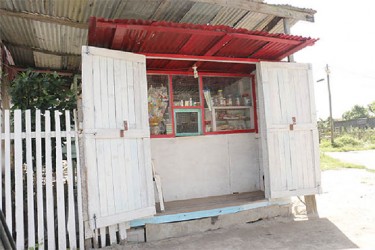
Ramsundar took the advice and cleared a piece of land; she was one of the first persons to squat on the estate.
“At that time it was just a handful of people living on the land, and whatever little money I got I would save it and buy slabs of mud to build up the yard,” she recalled, describing how she set up a salt bag house with plastic windows.
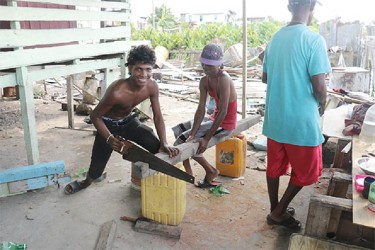
She recounted that as a child she remembered being poor, and her parents would move her and her six other siblings all over to live.” We went from one rent house to another. They never settled…”
She stated that she did not want that life for her children, and so she decided to settle. But there were many days, she said, when she did not have food to put on plates and money to send her children to school.
“We start from the bottom; now I’m living in a wood house and I’m thankful.”
She said her daughter grew up and was able to buy the piece of land they were squatting on when the government regularized the squatting area.
Now she said she does not have to endure people telling her that she does not have the right live somewhere. “We cannot complain about where we live because it’s a shelter for our families. We can’t do better so we have to accept this,”she said.
Ramsundar lives with her daughter, her son-in-law and her four grandchildren in a small makeshift wooden shack.
“Eventually everything cut out… they use to tell us we don’t have rights here… we might be squatters but that doesn’t mean we are not human like the rest of them.
“We might be poor. we might not be rich but we are rich in heart,” she said.
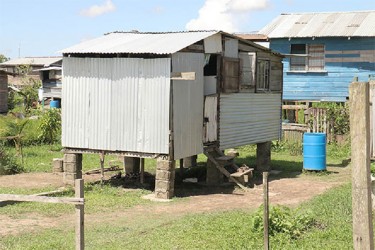
Collis Bradford is one man who is thankful for where he lives. Growing up as a young man in Patentia Housing Scheme, Bradford was accustomed to seeing people in his village move to squat on the estate land.
So when a friend encouraged him to squat he did not hesitate because he said he saw it as the beginning of his own independence from his family.
Bradford lives in a small 10ft x 10ft zinc house. The windows are covered with black plastic bags to keep the rain out.
As a cane-cutter at the Wales Sugar Estate, Bradford would get up early in the morning to fetch water for his wife. He has to walk a short distance to his neighbour’s house to fill his buckets with water so that his wife could cook and bathe.
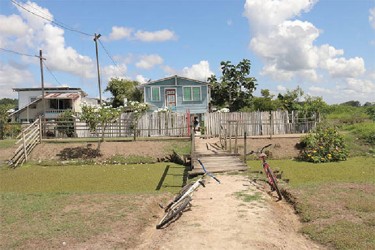
However, the real difficulty comes with having no electricity. He explained that GPL had installed electricity for several persons in the squatting area after their lands became regularized but after a while the systems were taken away.
Donston Jones, 35, has been living with his wife and two children in a small wooden house for over eight years. He said even though he loved living in Skull City it was hard not having electricity to press his children clothes or watch them in the nights do their homework in light.
He said there were many days when people were unable to send their children to the Patentia Primary School on the main road because there was either no water or uniforms were not pressed.
He stated that his was one of the homes where GPL had installed an electricity system, but after a few months they had returned and removed it. He explained that when he went into the utility, a member of staff had informed him that there was no indication in their system that the electricity had been removed from his house.
He lamented how he had to endure the “punishment” of watching his nine-year-old daughter light candles or “pitch torchlight” to study at night: “We all want better for our children and we are trying but we need light and water.”
Verna Sam said many families were given electricity last year and she was one of those who got light. She said had been living without electricity for over 13 years.
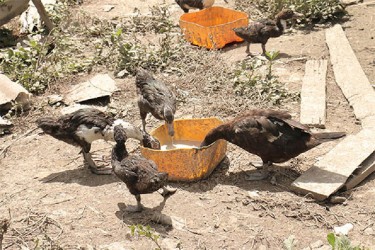
Sam first moved with her six children 14 years ago to Skull City because she had nowhere else to go. She said she could not afford to pay a rent and so she built a small wooden house, covered it with tarpaulin. She went on to say that there were very few houses in the squatting area at that time.
“When you are a single parent and you have so many children mine, you can’t afford to pay house rent and so you have to take whatever comes,” she said, adding that there were many days when she could not send her children to school or even afford to give them breakfast.
“I use to feel like I was doing so much but it wasn’t enough. I use to do two jobs to maintain them; all we had was this house.”
She said it was not until she met her husband that things started to change. He helped her build a better house but after a while people started to leave Skull City because they were fearful that the government would remove them. However, she stayed and a few
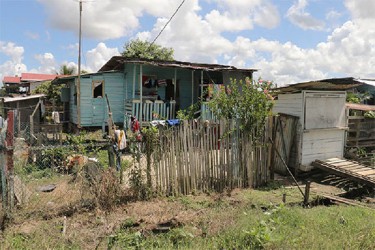
years ago she became regularized.
Things had changed, she said, in the village and many youths had turned to marijuana smoking and drugs. She said every morning she would wake up with smell of it.
She also told Sunday Stabroek that robberies had increased in the village because people were poor and wanted to put a meal on their table.
Even though most of the houses are of wood, there are many people who still live in zinc houses with plastic windows. In these houses many children are crammed into tiny match-like boxes with their parents. Most of the men are cane-cutters while the women are housewives.
